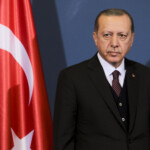Prominent constitutional scholar Mustafa Erdogan examines the Turkish opposition’s objectives and questions whether or not it is ready to take steps to truly challenge what he calls the “established order” if it wins the election.
This article was originally published by Diyalog News and translated by FTP with the author’s permission.
Foremost among these is the issue of who will run for president besides Kılıçdaroğlu. Technically, it is constitutionally impossible for incumbent President Tayyip Erdoğan to run for a third term. The Justice and Development Party (AKP) and its coalition partner must therefore—technically—nominate another candidate. But given his previous behavior, it will not be surprising if President Erdoğan once again ignores both the law and the Constitution.
With the decision by the President of the Republic on 10 March, the Turkish parliamentary presidential elections have been confirmed for 24 May. Although the election calendar has officially started, some uncertainties still remain.
In addition, the “People’s Alliance” –made up of the AKP and its coalition partner the Nationalist Movement Party (MHP), have not yet declared a program. This ruling coalition is also unlikely to have the personnel and knowledge necessary to rescue Turkey from its complex and difficult constellation of crises.
Unfortunately, the opposition bloc—known as the “Table of Six” for its six parties—also lacks a promising platform. Its relatively detailed program still does not address plans to overcome Turkey’s economic crisis, and it is not clear whether the Republican People’s Party (CHP) has the technical expertise necessary to do so.
Most worrying, however, is the fact that the opposition bloc has not yet put forward a genuine reform package. The Table of Six’s platform focuses mainly on transitioning to a parliamentary system of government, which would certainly mean some minor improvements to the current regime. But its program cannot be characterized as truly revolutionary: it does not make an effort to upset Turkey’s 100-year-old established order and move the country in the direction of freedom, justice, peace and democracy.
A truly reformist political program would aim to redefine in a manner that is different from the political philosophy expressed in Article II of the current Constitution, which states that “The Republic of Turkey is a democratic, secular, and social state governed by rule of law…respecting human rights, [and] loyal to the nationalism of Ataturk.”
I would rewrite Article II to ensure that the state of Turkey is a decentralized, secular, and democratic republic, based on human dignity and human rights, committed to the rule of law, and respectful of cultural diversity and minorities.”
The question is: can the “Table of Six” be in favor of a state defined in this way and, if so, to what extent?
It is likely that all members of the “Table of Six” could accept a reference to human dignity, human rights, the rule of law, and democracy in the constitution, even if only verbally. A genuine commitment to these values cannot be reconciled with the parties’ desire to maintain the established order.
However, it is very likely that the major parties in the opposition coalition—the CHP and the Good Party (IYI)—will regard a definition of the state that does not refer to nationalism (or at least to the “national state”), “Turkishness” and Atatürk as an attack on the state. In their eyes, the Republic of Turkey is not a civil-political union of citizens, but a nation-state of the Turk(s), which brings some sacred values with it—the most important of which is Kemalism. In this worldview, there cannot be a Turkish state without Atatürk.
In the same vein, the opposition bloc’s values of nationalism would strongly oppose the value of “cultural diversity:” they do not accept that anyone other than “Turks” live in Turkey. They will therefore see the phrases “cultural diversity” and “minority rights” as code words for separatism.
The same applies to decentralization, because the established parties are convinced that a centralized unitary structure is a matter of life and death for the Turkish State. Like “cultural diversity”, they see this as a concession to Kurdish separatism and as evidence of evil intentions designed to transition Turkey to a federal system. This mentality lies behind the Turkish opposition implementing the Council of Europe’s “Charter of Local Self-Government” as domestic law.
The same parties would also support the preservation of the “secular” characteristic of the Republic of Turkey in a constitutional revision, but they would want to do so on the condition that the meaning of the term is distorted. That is to say, on the condition that the Directorate of Religious Affairs (Diyanet), whose existence amounts to a kind of official religion, is preserved as a constitutional institution.
Although the minor partners in the Table of Six do not share the same enthusiasm as the others on the issue of secularism, we can assume that they will have no fundamental objection to the preserving the constitutional status of the Diyanet.
In short, if it wins the presidency and gains a majority in Parliament, I do not think that the opposition alliance will make any radical changes that would undermine the established order. Nevertheless, this coalition could put an end to the current anachronistic administration while making modest improvements in the political system—both of which would obviously be a gain for Turkish society.

